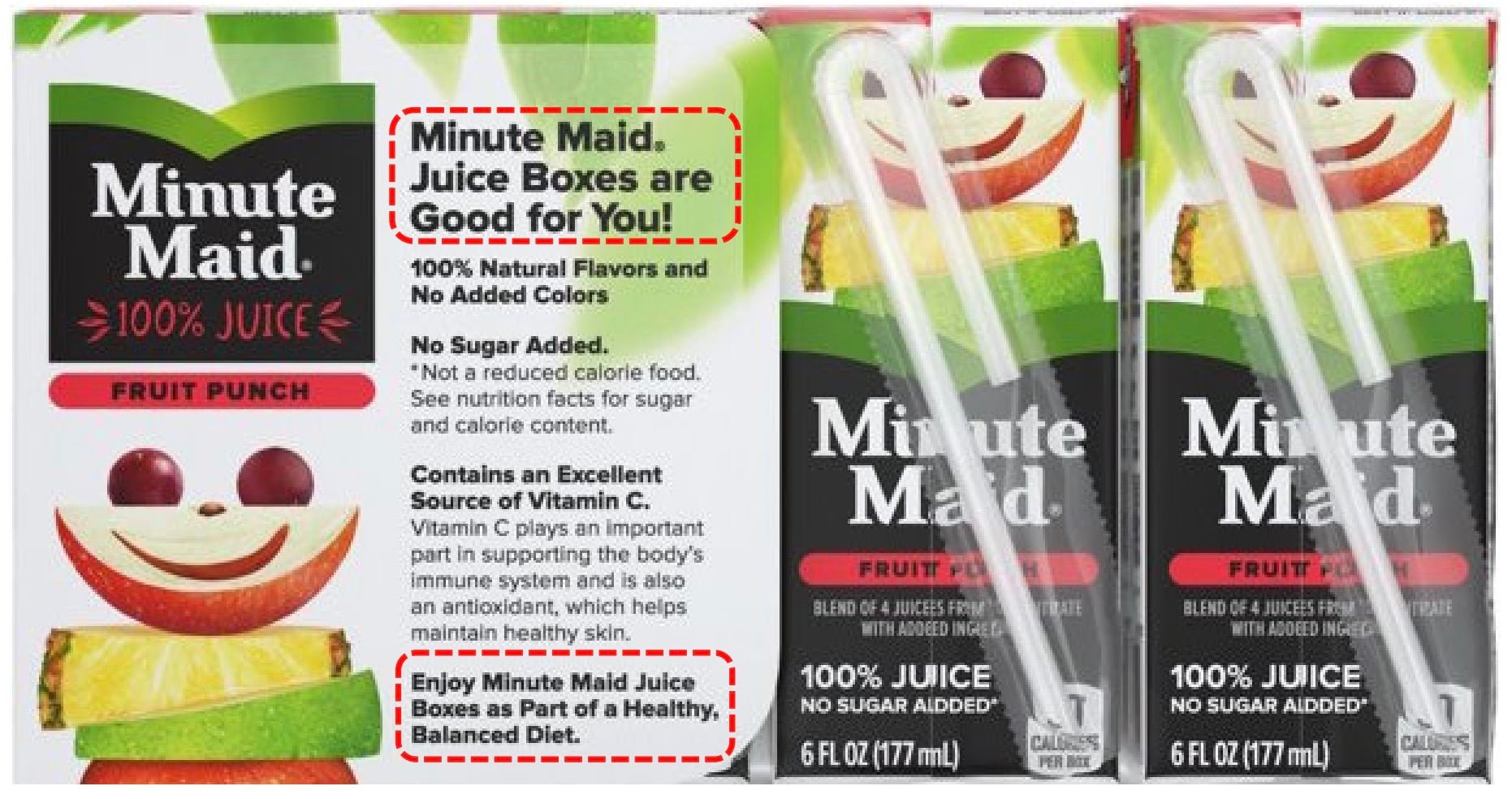U.S. District Judge Vince Chhabria ruled that consumers may be misled by the nutrition claims on the juice boxes.
SAN FRANCISCO (CN) — A federal judge this week ruled that Coca-Cola must face some claims from consumers in a class action over misleading nutrition information on the company’s six-ounce Minute Maid Juice Boxes.
Consumers originally filed the complaint in March. Gary Reynolds, the named plaintiff, sought to stop Coca-Cola from claiming on packaging that its six-ounce Minute Maid juice boxes are “good for you” and can be enjoyed as “part of a healthy, balanced diet.”
In his complaint, Reynolds cited health experts who have established that fruit juice is unhealthy — and that drinking it can increase the chances of harmful health effects like heart disease and type 2 diabetes.
Coca-Cola moved to dismiss the suit at a hearing in September, arguing that the disclaimers on the juice boxes were implied nutrient claims.
An implied nutrient claim is a statement suggesting that food, because of its nutrient content, can be useful in maintaining a healthy diet. Such claims are made in association with an explicit claim or statement about a nutrient.
U.S. District Judge Vince Chhabria, an Obama appointee, on Wednesday sided with Coca-Cola on one claim, ruling that the “Good for you!” statement on the back of Minute Maid juice boxes is an allowed implied nutrient claim and therefore that “state law challenges to it are preempted by federal regulation.”
“The back of the juice box has multiple statements that are uncontested nutrient content claims, including ‘No Sugar Added’ and ‘An Excellent Source of Vitamin C,’” Chhabria wrote. “It’s a close call, but ultimately the connection among the various statements is sufficient to render ‘Good for You!’ an implied nutrient content claim.”
Chhabria noted that the “Good for You!” statement appears in larger text at the top of a label panel that also contains statements about the juice’s sugar level and vitamin C contents.
“It operates like a topic sentence, where the assertions about particular nutrients appear to support the statement that precedes them,” Chhabria explained.
Reynolds argued that the connection between the statements was not direct enough because they are in different sentences, use different font sizes and are separated by a tab with the text “100% Natural Flavors and No Added Colors.”
Chhabria disagreed.
“Direct adjacency is not a requirement,” he wrote. “Rather, the inquiry involves determining whether there is a ‘connection given the words, their placement, and their context.’”
“Taking into account the context of the entire label panel, the ‘Good for You!’ statement is sufficiently connected to the sugar and vitamin C statements,” he added.
Coca-Cola must still face some claims about the packaging, however. That’s because the “Part of a healthy, balanced diet” label is not protected as an implied nutrient claim, Chhabria found.
“A different regulatory provision governs implied nutrient content claims that make explicit reference to health,” Chhabria wrote. He noted that companies may only use the word “healthy” or related terms as nutrient claims if certain conditions are met.
“One of those conditions is that, if the food item has been fortified with vitamin C to reach a quantity of ten percent of daily recommended amount, then the addition must comply with the fortification policy in the regulations,” Chhabria explained.
Reynolds’ complaint claims that the juice boxes violate that policy. Coca-Cola did not dispute the violation of the fortification policy in its motion to dismiss, but argued that it was irrelevant because the plaintiffs never properly alleged that there was less than ten percent to begin with.
Coca-Cola’s argument here “reverses the burden,” Chhabria wrote.
“The burden is on Coca-Cola to demonstrate that the juice boxes either meet the ten percent threshold prior to fortification or were fortified in accordance with the policy,” he explained. Because Coca-Cola did not meet that fortification threshold, the “part of a healthy balanced diet” label is not an implied nutrient claim, and state law challenges to it are not preempted.
“The complaint contains detailed allegations about health dangers posed by the consumption of fruit juice due to the quantity of sugar and the form of that sugar,” Chhabria wrote. “Taking those allegations as true at the motion to dismiss stage, it is plausible that ‘members of the public are likely to be deceived’ by the label statement.”
Reynolds also sought a preliminary injunction against Coke. Chhabria denied that request, noting that because his complaint “alleges that 100% fruit juice is never healthy,” he could “never again be misled by statements about the healthfulness of a 100% fruit juice product” and therefore lacked standing.
Amended complaints can be filed within 14 days.
Read the Top 8
Sign up for the Top 8, a roundup of the day’s top stories delivered directly to your inbox Monday through Friday.
